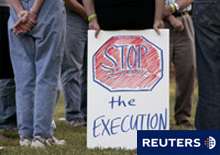
The recession in the United States is suggesting that its fiscal sensibilities are stronger than its appetite for retribution, threatening America’s status as the last major outpost in the Western World for the death penalty.
In Gregg v. Georgia, the United States Supreme Court ended the practice's nine-year-hiatus and said that it was not cruel and unusual punishment violative of the 8th Amendment. The Court found that it still comported with evolving standards of decency in contemporary society and fulfilled a legitimate retributive function, as well as possibly a deterrent role.
In McKleskey v. Kemp, it survived the Court's 14th Amendment equal protection analysis despite being 4.3 times more likely in the state of Georgia to be used if the murder victim was white as opposed to black, and also more commonly preferred if the defendant was black.
And just last April in Baze v. Rees, the Roberts Court held that it was still constitutionally sound so long as the method of execution employed did not pose a substantial risk that the condemned would suffer serious harm. Burning alive and disemboweling, probably not constitutional. Firing squad and electrocution? Just make it reasonably quick.
36 of the 50 states are united in the death penalty's survival in America. The Federal Government also retains it. Its continued life persists in the face of studies that show deterrence arguments to be dubious. Americans' historical taste for retribution has hardly waned, however. And theoretical arguments about the barbaric and hypocritical nature of capital punishment fall on deaf ears when they meet the monstrous realities of child killers.
But another harsh reality of capital punishment has recently been further exposed yet inadequately addressed. DNA evidence has provided to a near scientific certainty that at least 200-plus people have been wrongfully convicted. A number of these miscarriages of justice resulted in the imposition of a death sentence.
In California, Texas and Florida, the three leading states in order of death row populations, 34 people as of early last year were exonerated in time before being killed. Nevertheless, executions persist despite science's warning that the criminal justice system and its reliance on inherently flawed subjective evidence is even more fallible than previously thought.
But where evolving Western notions of decency can stagnate, where racism makes a mockery of platitudes about equality under law, and where the likelihood of outright irreversible errors fail to make a significant difference, an eminent force in the American fabric is altering yet another aspect of life, quite literally.
That force? Money.
The most recent casualty of the economic recession in the United States is the death penalty. An eye for an eye leaves everyone blind? No. More like, Money talks.
New Jersey was the last state to repeal its statute in 2007 when the American economy was not contracting.
Now in the midst of 2009's economic turmoil, lawmakers in Colorado, Kansas, Nebraska, New Hampshire, Maryland, Montana and New Mexico have all recently sought to abandon capital punishment, using fiscal necessity as their primary argument.
Processing a defendant through capital cases is more expensive for many reasons. The trials take longer due to the elevated magnitude of what is at stake. More court resources are required, often times at the taxpayer's expense when the accused is indigent.
Appeals are also lengthy and costly and more often utilized in capital cases. Further, many death penalty appeals that fail to be overturned in criminal courts result in making another run through the court system with a habeas corpus claim.
According to a recent New York Times article, a study conducted by the Urban Institute of Maryland found that putting someone on death row costs $3 million, $1.9 million more than if the prosecutor had pursued a prison sentence.
In Kansas, the disparity is less drastic yet still substantial. A state senator recently estimated that seeking life imprisonment without parole in lieu of using the expensive and time-consuming death row process would save her state over $500,000 per case.
While $500,000 is still a considerable amount of money, as of early last year there were only 9 people on death row in Kansas. It is also infrequently used in the majority of states that keep the option available. The nation as a whole only has some 3,300 inmates awaiting a death sentence out of a prison population of 1.6 million.
Nevertheless, every dollar counts in already over-stretched state budgets. A few life sentences instead of the capital murder process could save millions of dollars.
Not everyone is ready to skimp on retribution, though. The state of Virginia is seeking to cut costs by releasing offenders deemed to be "low-risk" from incarceration 90 days early. However, state legislators are also debating making accomplices to homicide-those who provide assistance but do not commit the actual act of murder-eligible for execution.
Old habits die hard.
Associate Professor at the University of Navarra School of Law in Pamplona, Spain

